Business Community Government
A filling station in the forest? Developers propose bringing gas, retail and more to the heart of Swede Hill
Leaving Highway 16 at Burnham Drive and turning left onto Sehmel Drive has always meant a quick shift into rural mode. As drivers navigate the winding two-lane road through Swede Hill and North Rosedale, over hills and alongside woods and scattered residences, there’s nary a place to shop or fill the gas tank before arriving at Rosedale Market, about 3 miles away.
That could change soon. A Milton-based developer called 6018 Sehmel Modular LLC proposes to build a gas station, convenience store, electric vehicle charging facility and coffee shop at the intersection of Sehmel Drive and Bujacich Road. Driving away from the freeway interchange, the businesses would front the left side of Sehmel Drive as the road takes a sharp curve westward.
Big plans for site
This commercial project is just the start of the company’s plans at the site. In a second phase, it proposes to re-develop adjoining land to the east, also along Sehmel Drive. This property, now home to vehicle storage lots and other uses, is more than five times bigger than the gas station and convenience store site, bringing the project’s total size to 13.5 acres. The developers propose to construct more than 75,000 square feet of new industrial-park buildings there.
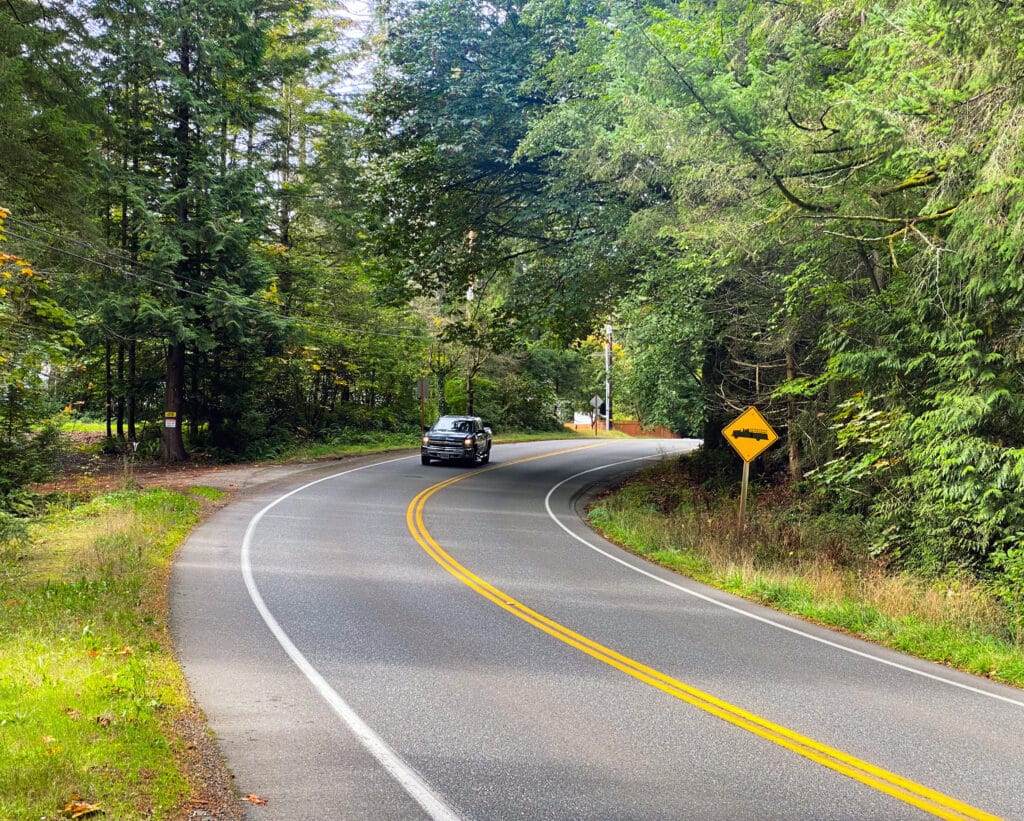
A developer called 6018 Sehmel Modular LLC proposes building a gas station/convenience store/coffee shop near this bend on Sehmel Drive. The development would be on the left in this picture. Photo by Ted Kenney
Today, the site at Sehmel Drive and Bujacich Road has a quiet, rural feel. This is accentuated by the towering evergreens of PenMet Parks’ 122-acre McCormick Forest Park, which wraps around the southern and eastern perimeter of the developer’s roughly triangular property.
In fact, maps from the Washington Department of Fish and Wildlife show the development site’s southeast corner overlapping slightly with an environmental feature considered by many to be the park’s crown jewel, a WDFW-designated “priority habitat” called the Purdy Old Growth forest. That’s a place where “the dark green forest canopy floats high above you like a giant circus tent, held up by the old growth trees like skyscraper-sized tent poles,” PenMet’s website says.
Maps merely a guideline
The developer’s hired environmental experts, Gig Harbor-based Soundview Consultants, visited the forest. Their report says they didn’t see any old growth extending onto their client’s property, and argues that the WDFW map is wrong. They point out, among other things, that the map is only accurate to ¼ mile.
“[T]he mapped old growth forest habitat is likely present within the McCormick Woods,” according to Soundview’s report. But “old growth conditions were not observed on the southeast corner of the [developer’s] property.”
“The mapping data provided through our public PHS tool is meant to identify the general extent of priority species or habitats,” a WDFW spokesman said. “The mapping data is a starting point and not meant to replace field-based, site-level mapping.”
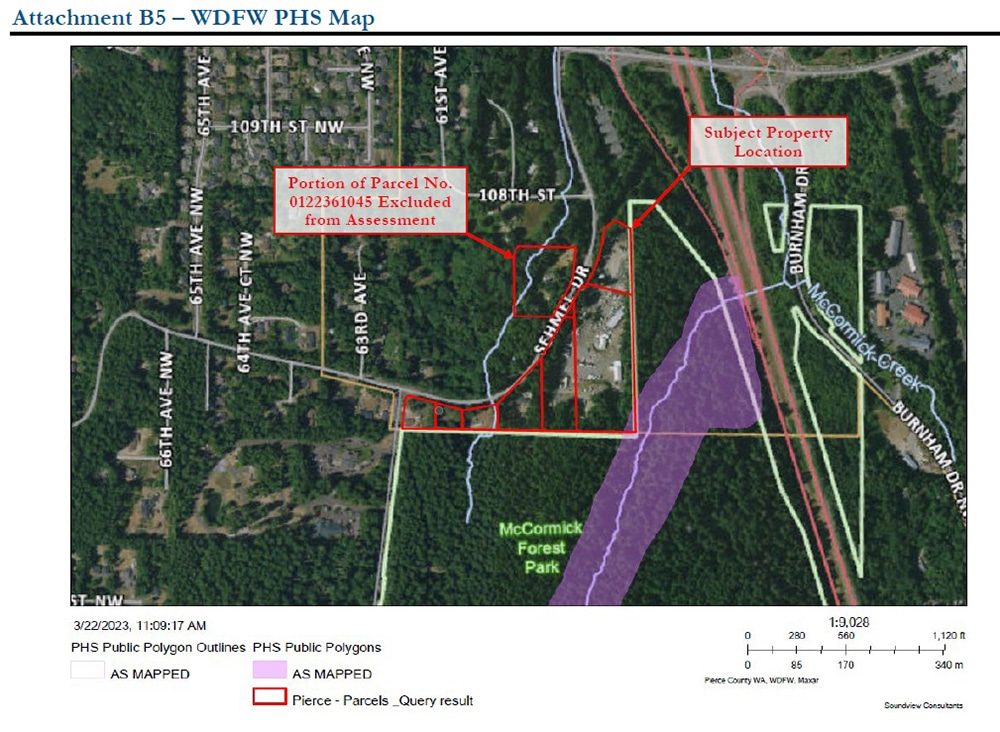
A Wetland and Fish and Wildlife Assessment conducted by Soundview Consultants for the project includes a Priority Habitat and Species (PHS) map from the Washington Department of Fish and Wildlife (WDFW). A red outline highlights the proposed development, south and east of Sehmel Drive. Purple shading indicates the Purdy Old Growth Forest, part of McCormick Forest Park. Soundview says the forest doesn’t actually touch the development property, and WDFW acknowledges that the maps sometimes are in error.
An independent environmental consultant hired by the city of Gig Harbor will assess Soundview’s claim of a mapping error as part of their overall examination of the development proposal, said Jeremy Hammar, senior planner for Gig Harbor.
Zoning questions
The plan was dealt a setback in September, when the city informed the developers that current zoning does not allow drive-through service at their proposed coffee shop. The city had mistakenly said that putting in the drive-through would require only a conditional use permit, which can be granted by the city’s hearing examiner (the proposed convenience store and gas station will also need conditional use permits).
But the city later corrected its error and informed the developers that they need a zoning amendment to build and operate the drive-through. This is harder and takes longer to get. The Gig Harbor Planning Commission and the Gig Harbor City Council would both need to approve the change, Hammar said.
The developers will pursue the zoning amendment and are now “in discussions with the city” regarding the details. But “the project will continue as planned with or without the drive-through component,” said Cutter Cannon of 6018 Sehmel Modular.
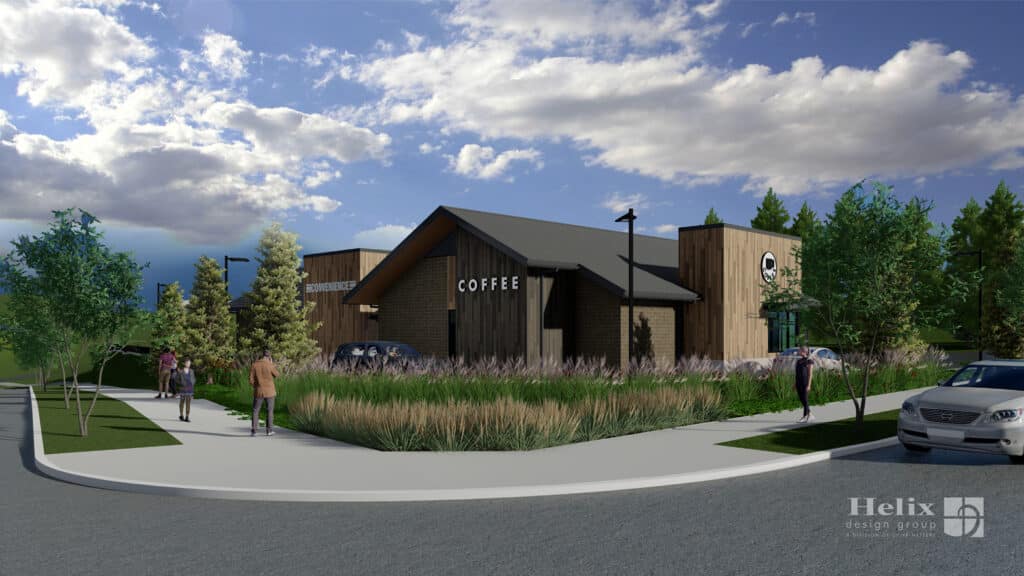
A rendering, filed with the project’s Design Review Board submittal, shows what the gas station/convenience store would look like from the corner of Bujacich and Sehmel. The status of the drive-through shown in this rendering is in doubt, however.
The family behind the proposal
Cutter Cannon said his firm comprises himself, his father Michael Cannon, and Michael’s brother-in-law (and Cutter’s uncle) Darrin Moloznik. Michael Cannon and Moloznik are also founder/CEO and vice president/chief operating officer, respectively, of Cannon Companies, a utilities contractor based in Milton. But the trio views the Swede Hill project as a family venture, separate from Cannon Companies.
“It’s kind of a legacy project,” Cutter Cannon said.
Both the Cannon and Moloznik families live a few minutes from the development site, Cannon said. They envision the finished gas station, coffee shop and convenience store playing a role in the neighborhood similar to that of the newly renovated Olalla Bay Market and Landing in its community, with “kind of a local feel,” he said.
The trio has not developed or run these types of businesses before. For that reason, “our goal is to have a development partner” with relevant background. The trio’s role in operating the businesses will depend in part on their chosen partner but “we would like to be involved,” Cannon said.
He said it’s too early to speculate on the gas station’s or coffee shop’s branding. He downplayed the possibility of a Starbucks, noting that “big chains are potentially interested in higher traffic counts” than they have at their intersection.
“A local chain would be great.”
A gas station desert
Do they fear the competition they would face from low-priced Costco gas, available just a mile away, across the freeway in Gig Harbor North? Even Rosedale Market’s former owners lament that regular customers of the store bought their gas at Costco, instead of from them.
But Cutter Cannon said his site’s proximity to Highway 16 lends it an abundance of potential customers, many of whom are not Costco members. He pointed out that besides Costco, the closest gas stations are in Purdy, and they are further from the freeway than their proposed site on Sehmel Drive.
The city temporarily paused its review of the development’s first phase — the gas station, convenience store, coffee shop and EV charging facility – while 6018 Sehmel Modular adjusts its application to reflect that it cannot create the coffee drive-through under just a conditional use permit, Hammar said.
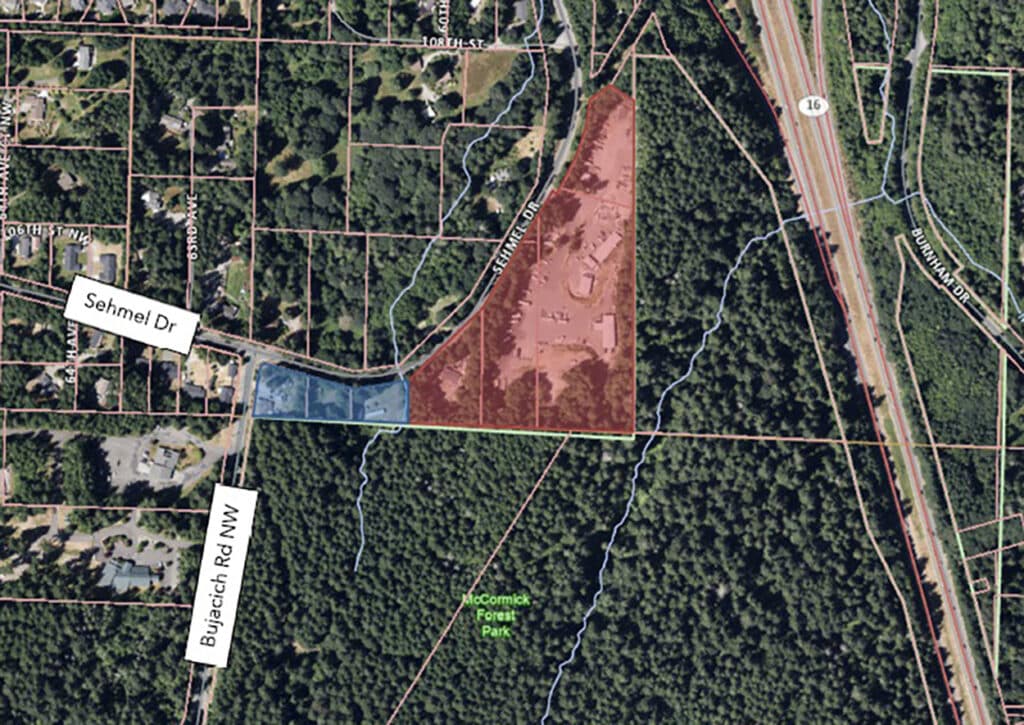
In this map from the project’s Traffic Impact Analysis by consultants Heath Associates shows the site of the proposed gas station, convenience store, EV charging stations and coffee shop is shaded blue. Red shading indicates the proposed industrial park development.
“Upon completion of reviews by the city, there will likely be additional comments for the applicant to address,” he said. Then a date with the hearing examiner will be set, to determine whether to grant the conditional use permits needed for the gas station and convenience store.
Neighbors have concerns
Some residents have weighed in against allowing the proposed development in their neighborhood.
John Lewis, who lives in nearby Henderson Bay Estates, emailed the city planning department that “commercial development of this sort would damage the essential character of the Swede Hill neighborhood.”
That character is residential, he said in an interview. While some non-retail businesses, like a storage facility, operate west of the Highway 16 interchange, “there’s no retail at all on this side of the highway.”
Lee Van Komen, another neighbor, does not necessarily oppose the project but has concerns about the traffic it would generate, especially hazards from vehicles on the Sehmel Drive curve turning left into the development.
Van Komen noted that traffic gets especially heavy during shift changes at the nearby women’s prison. He speculated that the growing stream of cars going to and from the nearby Washington Corrections Center for Women and businesses that have sprung up on Bujacich Road is an impetus behind the proposed development.
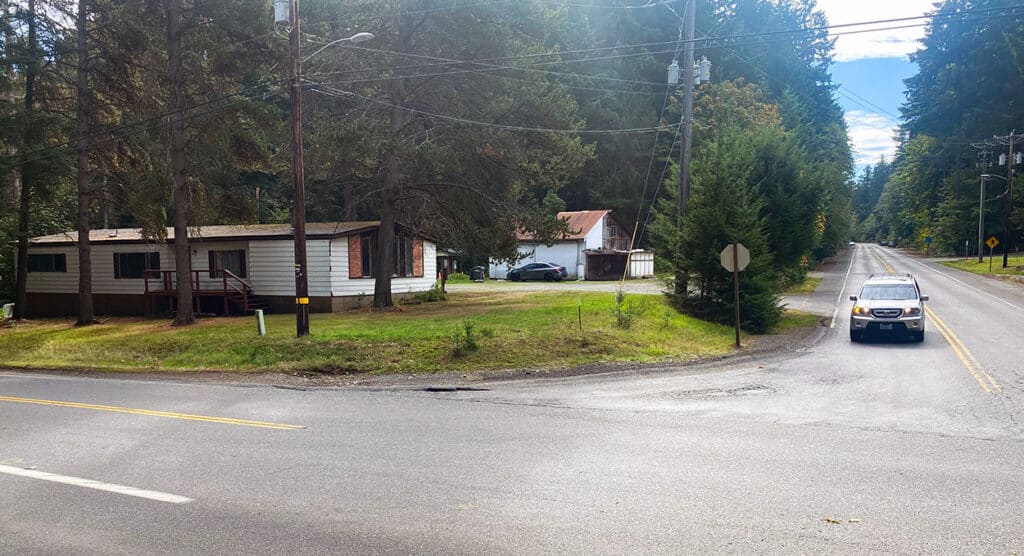
The intersection of Sehmel Drive and Bujacich Road in Gig Harbor. Photo by Ted Kenney
Traffic analysis
The proposed development would add to growing congestion in the neighborhood, according to a Traffic Impact Analysis for the developers by consultants Heath Associates, submitted as part of the project’s Major Site Plan Review application.
The report assumes build-out of the development will include adding a center two-way left-turn lane along the project’s Sehmel Drive frontage. It also assumed the industrial park would have two driveways onto Sehmel Drive, and the commercial site would have one driveway onto Sehmel Drive and another onto Bujacich Road.
The report concluded that the industrial and commercial portions of the project together would generate an additional 158 vehicle trips during the weekday morning peak hour, and 112 trips in the weekday evening peak hour.
The report looked at traffic delays at nearby intersections, now and in 2027. It stated results in terms of “level of service” (LOS) ranging from “A” to “F”. For example, at a signalized intersection, a LOS of A indicates an average delay of 10 or fewer seconds, while an F level of service means an average delay of more than 80 seconds.
The city considers intersections with an E or F LOS to be failing.
Grading the intersection
Currently, the intersection of Sehmel Drive and Bujacich Road has a C level of service (average 25 second delay) during evening peak traffic. The intersection of Sehmel Drive and Burhnam Drive is at LOS D (30.5 second delay) during peak evening traffic, the report said.
It projected that in 2027, without the commercial and industrial projects, the Sehmel Drive/Bujacich Road intersection will fall to an E LOS (37.5 second delay) during evening peak traffic. With the projects, it will still garner an E LOS, but with an average 45.4 second delay.
However, creating separate northbound left- and right-turn lanes on Bujacich Road could bring the level of service up to C (average 17.5 second delay), even with 6018 Sehmel Modular’s developments, the report said.
The report predicted failure levels of traffic congestion by 2027 at the intersection of Sehmel Drive and Burnham Drive. By that year, that crossing would have an E level of service (average of 46.9 second delay) during evening peak traffic without 6018 Sehmel Modular’s project, and an F LOS (61.6 second average delay) with the project built.
To alleviate congestion at this future failed intersection, the report noted that the Washington State Department of Transportation’s 2018 SR 16 Tacoma Narrows Bridge to SR 3 Congestion Study proposed building a new roundabout within 10 years.
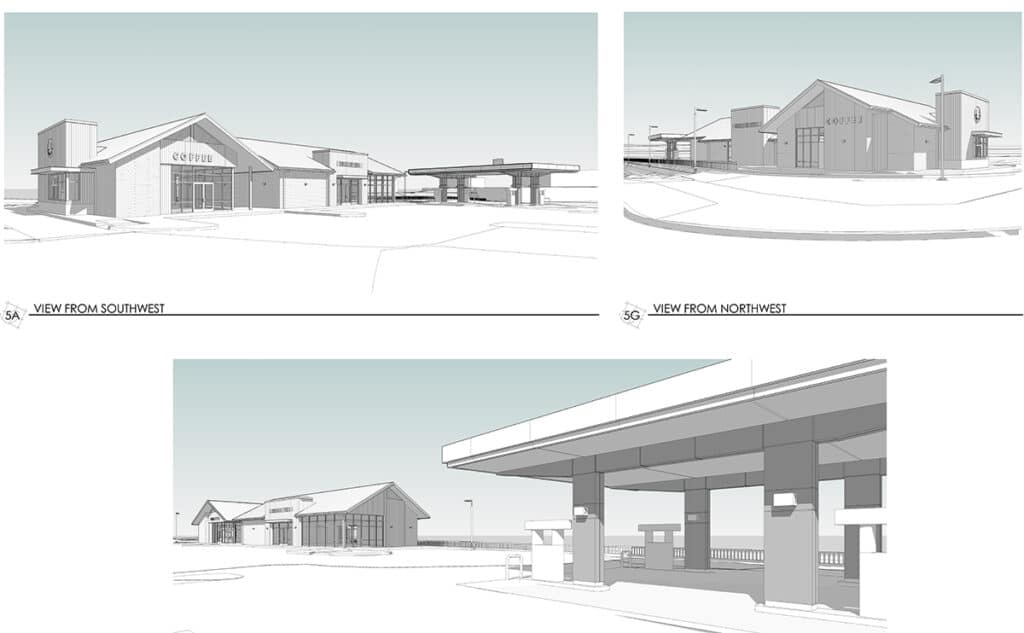
Images filed with the application show what a gas station-convenience store at the corner of Bujacich and Sehmel might look like.
Another roundabout in the future?
Gig Harbor City Engineer Aaron Hulst said the public works department has not yet reviewed the Traffic Impact Analysis. That will happen when the city resumes processing the application, currently paused for the applicant to address the coffee drive-through question.
Hulst said a roundabout at Sehmel Drive and Burnham Drive “has made the list for long-range projects.” He said the city likely will hammer out further details of such an improvement, including its timeline, when it updates the Transportation Element of its Comprehensive Plan. The update is in progress now. State law requires it to be finished by the end of 2024.
The Traffic Impact Analysis concluded that to mitigate the effects of increased traffic brought on by the new commercial and industrial projects, the developers should be responsible for upgrading the intersection of Sehmel Drive and Bujacich Road with northbound right- and left-turn lanes.
As further mitigation, it said that 6018 Sehmel Modular should pay traffic impact fees. Those charges, based on the total increase in peak evening vehicle trips generated by the project, should be $622,978.80, the report estimated. The city would determine the exact amount if it issues building permits.
